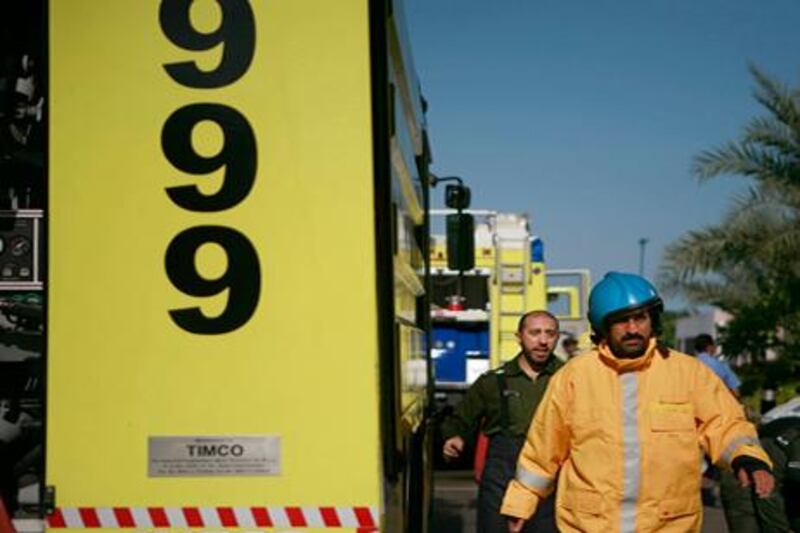A new survey reveals worrying gaps in first aid, indicating that many people in the UAE do not know what to do or whom to call in an emergency.
Twenty-one per cent of the poll's 751 respondents would know what to do if someone were choking, and 29 per cent said they would be able to cope if someone fainted.
Most respondents said they are not confident they could deal with an incident such as a sprain or an allergic reaction.
A disturbing number were unable to even give correct phone numbers for emergency services.
The survey also found that many parents routinely leave their children in the care of maids, nannies and teachers who lack first aid training.
The findings of the survey, conducted by YouGov Siraj for Al Aan TV's Nabd al Arab (Arabs' Pulse) show, affirm fears expressed by many doctors.
Dr Mohamed Shmisi, a paramedic and a first aid trainer for the Red Crescent, said: "We ask people in every class if they help in case of an emergency. A big number say no, either because people don't know or they are scared of the law," he said.
Dr Ali Damanhouri, an emergency doctor at Tawam Hospital, said first aid training was "crucial ...it is basic knowledge. It can save lives or decrease complications."
Ali al Hosany, an emergency and public safety officer with Abu Dhabi Police, echoed the survey's findings, saying very few people know what to do.
"Around 10 per cent of the public know, and the majority were over 30," he said. "The rest need to learn about it because their ignorance might cause death."
Legally, anyone can give first aid if they have taken a course. However, the injured person can legally be moved only by a paramedic.
Calling paramedics, though, is a problem in itself.
When asked if they knew the number to call for an ambulance, one in three (33 per cent) either gave the wrong answer or failed to answer. Even more (39 per cent) failed to give the right number for firefighters, while a quarter (24 per cent) did not know the number for police.
(To call police, you dial 999; the call can be re-routed to the fire or ambulance services. Or you can call the fire service directly on 997 and an ambulance directly on 998.)
Staff Col Ali al Dhaheri, head of police operations at Abu Dhabi Police, was staggered that so few knew those numbers.
"It is impossible, impossible," he said. "The numbers are available everywhere ... the results are shocking. All police cars have 999 printed on them, the emergency number is international - there is something wrong here."
Dana Shadid, a producer on Nabd al Arab, said the survey demonstrated the need for more publicity, saying emergency numbers should be displayed on billboards to drive the message home.
"People should [know] these numbers, they might need [them] when they least expect it," she said.
The picture was little better for schools, which are legally required to have a trained first aid provider. Only 57 per cent of parents said their child's school or nursery did. Some 14 per cent were certain there was not one at their children's school.
That should change soon, according to Brian Fox, who is withthe Abu Dhabi Education Council. Adec is planning to train staff at all schools in health and safety methodsthis spring.
"Some schools, like villa schools, do not have one, so we are working with HAAD [Health Authority Abu Dhabi] to address these issues," he said. "But all schools are required to have a head trained medical nurse and an approved medical clinic."
The problems do not stop at schools. In a country where many rely, at least in part, on maids and nannies as providers of child care, only a third (32 per cent) of those with domestic staff say their workers are trained in first aid.
That came as little surprise to Lazia Suficiencia, head consultant at Majestic Nannies in Dubai. She said first aid training was rarely a priority for families hiring maids and nannies.
"Some of them do have training," she said. "The majority don't, though, and people are not asking for it."
She estimated that 75 per cent of families did not ask for maids with training in first aid.
Emirati families were most likely to have maids or nannies without first aid training (78 per cent). Among western families, 43 per cent of staff did have such training, the survey results indicated. Among Asian families, 47 per cent had staff who had taken first aid training.
Dr Gowri Ramanathan, an obstetrics and gynaecology consultant at Corniche Hospital in the capital, stressed that anyone working with children should be trained in first aid.
"It is essential to have basic life support training and awareness," she said.
"People do drown and children do choke and it is the initial few minutes that are essential.
"Maids absolutely need training - especially in this region where the majority of children are being looked after by nannies.
Dr Shmisisaid parents and maids especially need to know how to deal with choking, which is very common in children.
"An adult could swallow a dirham, but a child's airway is much smaller and they can choke easily," he said.





